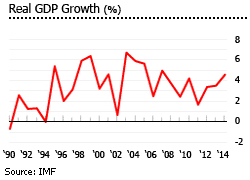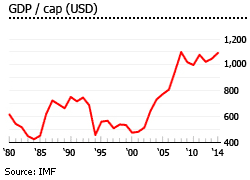Senegal’s property boom continues
Senegal's capital, Dakar, is in the midst of a property boom. Luxury villas, hotels and shopping centres have sprung up in the country in recent years, more particularly in Dakar's coast.
From 1994 and 2010, Dakar property prices surged by about 256%, according to Senegal National Statistics Agency. Dakar's property market is a favoured investment for regional elites because it is considered as a safe haven in turbulent West Africa. Also, Dakar is a peninsula, "It is widely recognized everywhere in the world that where space is restricted, prices have a tendency to rise," says M. Thierno Mamadou Kâne of the Notarial office Amadou Moustapha Ndiaye et Aida Diwara Diagne.
Dakar continues to experience double-digit increases in property prices in recent years. The major driver is sharp population growth. Dakar's increasing population is mainly fuelled by migrants from rural Senegal and neighbouring countries. Currently, the country has about three million people.
High-end property buyers from countries like Nigeria have increasingly seen Dakar, located on a peninsula that is Africa's westernmost point, as a reliable market for second homes, said Robert Tashima of Oxford Business Group.
Moreover, the widespread money laundering in the country is also driving the property market.
Money laundering fuels the property market

The prevalent money laundering in Senegal is fuelling the property boom, has alleged Mouhamadou Bodj of Forum Civil, the local branch of Transparency International. For instance in 2009, the total amount of real estate under construction in the capital stood at about CFA240 billion (US$439.1 million), of which only CFA10 billion (US$18.3 million) was financed by bank loans, said Bodj.
"The property boom is related to stolen money, corruption derived from drug trafficking linked with neighbouring Guinea-Bissau," claims Bodj.
This was supported by the state agency National Cell for the Treatment of Financial Information (CENTIF), which also claimed that suspicious money flows accounted for nearly one-fifth of the country's economic activity between 2004 and 2011.
Housing shortage despite construction boom
Senegal has a shortage of affordable housing. Many residents of the Ouakam neighbourhood near Dakar's international airport have built illegal dwellings near the runway, prompting clashes with the police.
About 200,000 extra houses are needed in Senegal, and every year an increase of about 10% of the total housing stock is needed. Constraints to supply include the lack of formal market players, limited availability of serviced land, limited availability of relevant financial products, high construction costs, and weak government policy, according to the Centre for Affordable Housing Finance in Africa.
In an effort to solve the problem, the government introduced the 'One Family One Roof' program, which provides free housing and land, tax breaks and a range of subsidies to homebuyers who purchase housing that costs less than US$15,000.
However, the housing shortage remains. Recently, protesters gathered near a breeze-block wall constructed to house the Turkish embassy compound. The protests have highlighted the anger of the residents over surging property prices that are swallowing the coastline and squeezing ordinary household budgets.
Sall plans to develop areas outside the capital

President Macky Sall is now planning to extend development to areas outside Dakar, as the latter becomes increasingly packed. About 80% of the country's industry is concentrated in Dakar, according to Djibril Diop of the University of Montreal in Canada.
The relocation of the capital's airport to a site 30 km outside Dakar is also expected this year, which will help alleviate land shortages. The government also plans US21 billion to be allocated to infrastructure development by 2018, mainly for the countryside outside the capital.
"We're launching a new economic hub in Diamniadio, 30 km from Dakar," said President Sall. This will require the construction of roads and the refurbishment of a railway.
Large rental market, soaring rents
More than half of Dakar's roughly one million residents are renters, according to the country's national statistics agency. Dakar's residential rents have risen continuously over the past two decades, and now often rival rents seen in large European cities. Rents in Dakar's downtown Plateau district are almost twice those in the central business district of Abidjan, Ivory Coast's commercial capital.
Outside the capital, the problem for the buyer is the relatively short leasehold terms which are available to buy. Various sections of the coast have been taken out of state patrimony and leased to development companies, for lease to tourists/investors. But the parts of the Petite Cote available to foreigners were originally leased 50 years ago, and only 24-26 years of that lease remain.
Rent control law
President Sall passed a new rent control law in January 2014 imposing across-the-board rent reductions. The law particularly benefits low-income renters.
Range of rent reductions:
- 29% for monthly rent payments below CFA150,000 (US$275)
- 14% for apartments with monthly rents between CFA150,000 (US$275) and CFA500,000 (US$915)
- 4% for apartments with monthly rents over CFA500,000 (US$915)
President Sall has received wide praise for the law from residents frustrated with Dakar's expensive housing stock.
However, many are still pessimistic about the new law, given the shortage of space in the capital. Former President Wade had also attempted to cool the property market through a 2010 law setting prices per square meter for land and property, but he failed to prevent rents surging.
The rent control law also fails to incorporate a mechanism to regulate future rent increases, which means that landlords are not prevented from increasing rents as new contracts kick in, according to opposition legislator Thierno Boccoum.
"This decision will spur unfortunate tensions between owners and tenants without decreasing rents or hampering speculation," argued Boccoum.
Senegal is a nature's wonder
Many tourists are attracted to Senegal because of its luxury beach resorts, natural and historic sites. Most of the year, the Senegal has a Californian climate. It has a fast-growing tourist industry (now 1.4 million tourists per annum visit Senegal, which has a population of only 10 million).
Senegal's coastal capital Dakar is the largest and most cosmopolitan city in West Africa.
Senegal is a Muslim country but Central African Islam is not like Arab Islam, it is tolerant. The sudden arrival of large numbers of scantily-clad French and Scandinavian tourists has not thrown the Senegalese off.
Many Senegalese have a high-quality French education and are internationally-minded. There is a large expatriate community, good internet and air connections (Air Senegal was bought by Royal Air Maroc and is now efficient).
And there is a genuinely reformist, progressive democratic government, a real exception in this corner of Africa.